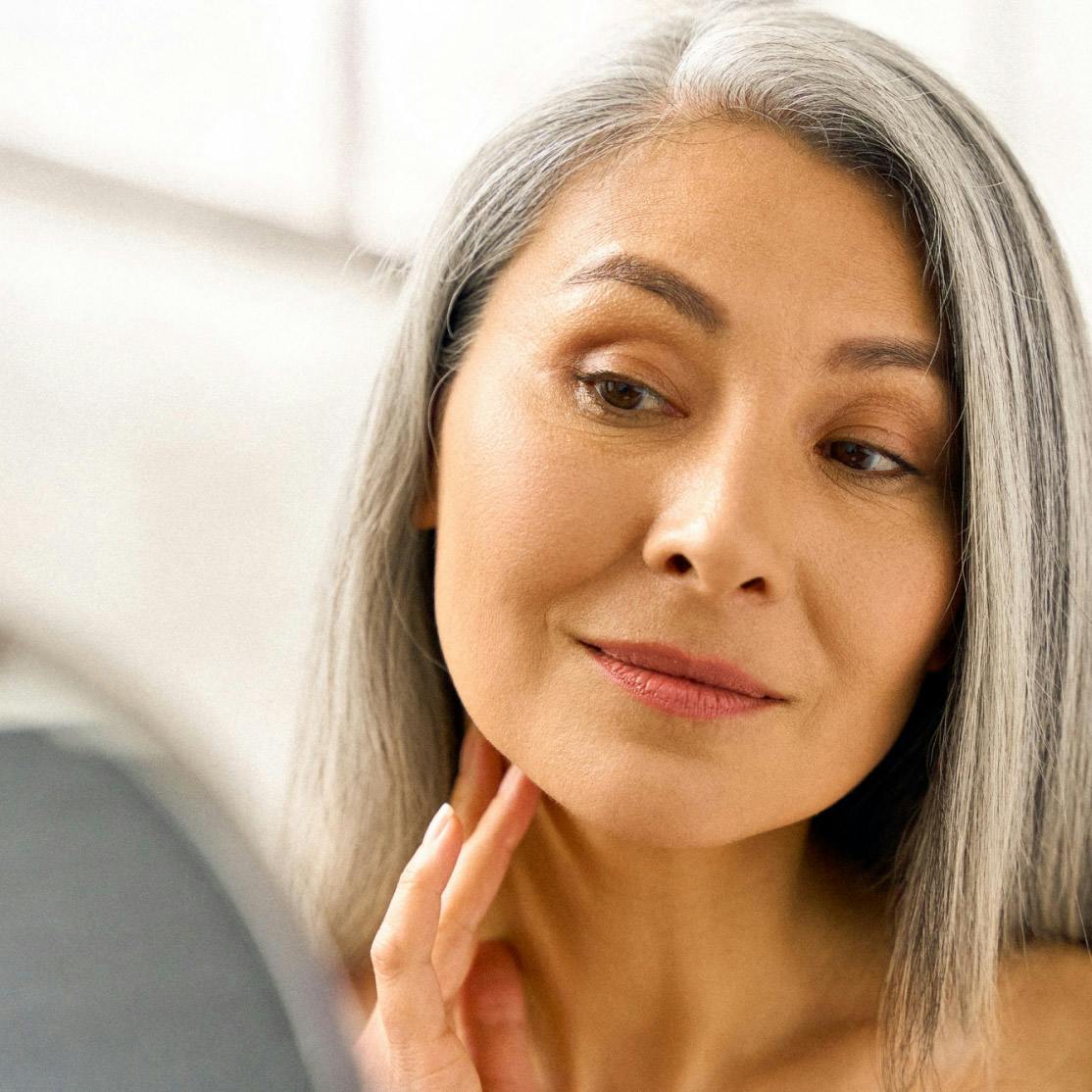Menopause and puberty have a lot in common, especially when it comes to fluctuating hormones and unexpected changes, like acne. Menopausal acne, often appearing on your face, back, or other areas, is a common and frustrating symptom of hormone shifts. With guidance from a healthcare professional, you can tackle these breakouts and feel more in control of your skin.
What Causes Acne During Menopause?
Let’s start by talking about why puberty and menopause have a similar impact on our bodies. Both times represent a massive shift in your hormone levels, bookending your reproductive years. While puberty prepares you for childrearing, menopause prepares you to stop ovulating. And there are a surprising amount of shared symptoms between the two. Interestingly, the way your body reacted to puberty all those years ago could provide clues to how your body will react to menopause.
Menopause marks the end of your menstrual and reproductive years, when your body needs less estrogen to function because you’re no longer preparing for ovulation (and the release of an egg) every month. But estrogen does more than just trigger menstruation. It plays a role in your bone health, brain function, metabolism, and more—including your skin health.
One of estrogen's many roles is to keep your androgen levels in check. Androgen is a sex hormone that’s present in everyone, but more prominent in men. Androgen stimulates hair growth, helps regulate sex drive, and pushes skin to produce oil.
Since you finished puberty, your estrogen and androgen levels have been more or less in balance. But once your estrogen levels begin to fluctuate and gradually decline, they stop regulating your androgen as well. Your skin then produces more oil as androgen (testosterone) levels increase that can mix with the dirt and bacteria on your face to create clogged pores or blackheads. Your body may respond to blocked pores by initiating an immune response, which leads to whiteheads, cystic acne, and those deep, painful “underground” pimples.
Your body will eventually adjust to your new hormonal levels, but an imbalance between estrogen and androgens may persist for a few years. That can feel like a long time, dealing a blow to your confidence and self-image.
At Midi, we know how positive a woman's menopause experience can be when she works with a healthcare provider who takes her symptoms seriously. Midi clinicians have extensive training in women’s midlife health, so they understand the “why” behind everything you’re experiencing, including acne.
To get personalized recommendations based on your symptoms and health history, you can book a virtual visit with a menopause specialist through a platform like Midi.
What are the Risk Factors For Menopausal Acne?
Not everyone experiences acne during menopause, but some women are more likely to break out than others.
- Genetics: The first indicator you may break out during menopause is in your DNA. Did your mother, grandmother, aunt, or other female family members complain of acne during the menopause transition? If so, you’re likely to as well. This doesn’t mean that blemishes are inevitable, though. Proper treatment can keep your skin clear and clean. Understanding your risk factors may help you be more proactive about your skin care routine.
- Past breakouts: If you struggled with acne during puberty, pregnancy, postpartum, or any other time marked by significant hormonal change, menopause may serve up a similar experience.
- Lifestyle factors: There’s a noted link between acne and stress, and midlife can be a tension-filled time as family, work, and financial responsibilities reach their peak. Your breakouts may indicate that you need to carve out more time for self-care. Your diet can also influence your skin; processed foods can aggravate acne, as can dairy and sugar. If you smoke or use nicotine products, you are at a higher risk of developing acne as well (as if you needed more reasons to quit).
Acne in Different Stages of Menopause
Not all menopausal acne is created equal. While it can begin at any stage of perimenopause or menopause, it usually moves through different stages.
Perimenopause is the period of time leading up to menopause, which is marked by going a full 12 months without a period. Perimenopause usually starts in your mid-40s, though some women enter it as early as their mid-30s. During perimenopause, you’ll experience some symptoms of fluctuating and declining estrogen levels while still having your period. As your estrogen levels begin to drop, you may notice your skin becoming thinner and less elastic, and you might see more pimples than usual.
As you enter late perimenopause and your body has less estrogen to mitigate the effects of androgens, deep cystic acne might develop along your jawline and cheekbones. These pimples are large and painful, and sometimes never come to a “head.” Your skin may continue to thin, due to a loss in collagen (also thanks to less estrogen), and you may find that you need a complete overhaul of your skincare routine.
Once you hit menopause and beyond, you may continue to experience cystic acne along your jaw and cheekbones and you may even experience scarring, because aging skin thins and repairs itself more slowly. Your acne may start to abate as your body adjusts to no longer having periods, but if not, seek support from a healthcare provider or dermatologist.

When to Consult a Professional
When it comes to acne during menopause, there's a line between the occasional pimple and a full-blown skin crisis with acne that's painful, persistent, and leaves behind scars. Even if your acne is occasional and mild, consulting a dermatologist or menopause specialist can help you build a solid skincare routine to avoid things getting worse.
No matter what your situation, talking to a healthcare provider should be your first step in building a skincare routine that meets you where you are now. It may require switching up products that have been your go-tos for years but no longer benefit your menopausal skin.
Most dermatologists can diagnose hormonal acne just by looking at it. It often presents in clusters along the jawline and cheekbones, with predominantly cystic acne and whiteheads present. Your healthcare provider will likely ask about your personal and family history with acne, any patterns you notice with your breakouts, and what products you’ve used to combat it so far. Once they have a comprehensive picture of your skin health, they’ll build you a tailor-made routine to address your situation.
Managing and Treating Menopausal Acne
While menopausal acne can be maddening, it’s also highly treatable. So don’t suffer in silence. Your healthcare provider can prescribe the best acne treatment for your unique skin needs.
How Do I Treat Menopausal Acne?
Before prescribing any heavy-hitting medications, your doctor will likely suggest you explore over-the-counter methods first. If this is your first time experiencing acne, you may find that a more stringent face wash paired with a heavier moisturizer does the trick. Ingredients like salicylic acid, benzoyl peroxide, and alpha hydroxy acids are all instrumental in helping keep acne at bay. Look for products marked as non-comedogenic, which means they won’t clog your pores.
There are also some surprisingly strong and effective formulas available over the counter. Retinol, a form of vitamin A that acts as an exfoliant, encourages cell turnover in the skin and keeps pores free of excess oil. Many women rave about retinol for its skin-smoothing properties as well. However, retinol can dry out your skin, so consult a doctor before incorporating it into your routine.
What Medications Can Help With Hormonal Acne?
If over-the-counter methods haven’t helped your breakouts, your doctor may recommend more prescription options, including:
- Tretinoin: This is a retinoid that’s a stronger version of its over-the-counter sister. If your acne has left scarring, or you’re experiencing acne as part of perimenopause, tretinoin may be your best bet. This cream, while effective, can be drying, so plan to pair it with heavy-duty moisturizer.
- Hydroquinone: While hydroquinone is not formulated to prevent acne specifically, it’s another topical cream that helps lighten acne scarring and other dark spots on the face.
- Oral antibiotics and androgen suppressors (such as spironolactone): These are two popular oral medications for treating acne in adult women. If you are perimenopausal, ask your doctor about birth control pills too, as they may help your acne, irregular periods, and other symptoms, all while protecting against unplanned pregnancy.
- Hormone replacement therapy (HRT): If acne is just one of several menopause symptoms you’re experiencing, your doctor may recommend HRT. Because so many uncomfortable menopause symptoms are linked to the decrease in estrogen, HRT may ease your acne while also addressing other symptoms. With HRT, you’re not fully replacing hormones in your body as much as you’re supplementing them as they decline. Your doctor will prescribe supplemental estrogen and progesterone to help ease your symptoms, including acne, caused by hormonal fluctuations (women who have had their uterus removed do not require progesterone). HRT takes many forms, including a patch, pill, cream or gel, and should be personalized to your health history and symptoms.
A Midi specialist can review all the benefits, potential risks, and possible side effects of different prescription options, so you can determine the best approach that supports your skincare goals.
Lifestyle and Home Remedies
Just as you probably learned during your teen years, your lifestyle choices (from what you eat to how often you wash your face) play a key role in managing menopausal acne. In conjunction with any necessary prescriptions, these lifestyle adjustments can help support a clearer skin with a smooth, even tone.
Dietary Changes and Skin Health
Diet and skin health are more closely connected than you may think. Studies have shown that high-glycemic diets—that is, diets high in sugar and empty carbohydrates—can lead to more breakouts. Likewise, cow’s milk and dairy products have a strong link to acne. One study found that girls who regularly drink milk are 44% more likely to develop acne. Cutting out dairy and processed foods may be transformative for your skin.
Supplementing your diet with certain vitamins and nutrients can boost skin health. Vitamins A and E are known to aid in skin repair and protect against damage. Zinc is also an excellent supplement to take through menopause, as it helps stimulate collagen production and decreases inflammation. However, it's important to remember that supplements should complement, not replace, a balanced diet. Aim to get most of your vitamins and nutrients from meals rather than a capsule.
Stress Management and Skin Care
We all had this happen: In the middle of a stressful week, a major pimple shows up (which doesn’t exactly make life easier!). It’s just more proof that effective stress management is crucial for both mental well-being and skin health. Consider dedicating 10 to 20 minutes of your day to intentional mindfulness exercises, like meditation or deep breathing. Even short moments of mindfulness can reroute neural pathways in your brain, leading to long-term change.
You might even find that your skincare routine becomes part of your mindfulness habit. After hitting on the right products for you, turn your daily face washing into a self-care ritual. Lean into it by dimming the lights, playing soft music, and taking your time while you massage in cleanser and moisturizer.
Exploring Alternative Therapies
At Midi, we believe in a well-rounded approach to health that considers more than just traditional medicine. And a number of natural remedies have been shown to be effective at calming acne.
- Tea tree oil, an antimicrobial agent, has been shown to be effective at clearing up active breakouts. Tea tree oil can be overly drying in strong concentrations, so ask your doctor for product recommendations.
- Green tea extract is a popular natural remedy for acne and inflammation due to its high concentration of antioxidants, particularly catechins. These catechins ease swelling around acne breakouts, reducing redness and irritation. When used regularly, green tea extract also helps to regulate sebum production and reduce excess oil on the skin.
- Kaolin clay is another powerful ingredient that pulls impurities out of your pores. One study found that using a kaolin clay mask twice a week reduced oil levels in the skin, improved skin hydration and reduced acne scars. Too much kaolin clay can be drying, so you may find that once a week—or even just twice a month—is more than enough to keep your skin clear.
- Acupuncture and its anti-inflammatory effects may contribute to acne improvement, though the research is still new. You may find that acupuncture is particularly powerful if you’ve been experiencing bloating or joint pain during menopause, as well.
Prevention and Long-Term Skin Care
Your body is going through a lot of changes during menopause, and, whether you’re struggling with acne or not, this may be the perfect time to assess your skincare routine, along with other lifestyle factors, and make updates that match what your skin needs now.
Proactive Measures for Acne-Prone Skin
The key to managing acne-prone skin, especially during menopause, is to recognize and steer clear of triggers. If you know that every time you eat dairy products, you break out the next day, it’s time to try almond or oat milk. This applies to your skincare products, too: Coconut oil and other ingredients can be common culprits for clogged pores. If you’re unsure what your specific acne triggers are, consider an elimination diet for your favorite foods and skincare products. As you slowly add them back in, you can see which ones are now causing breakouts even if they didn’t before.
A consistent skincare routine is crucial for maintaining healthy skin. This includes gentle cleansing to remove dirt and excess oil, using non-comedogenic moisturizers to keep the skin hydrated, and exfoliating regularly but gently to prevent clogged pores. You may also find that your skin responds well to a light toner or astringent.
Finally, picking at acne is the easiest way to make it worse. Invest in some pimple patches, small hydrocolloid bandages that remove the oil and sebum from your acne and promote healed skin. These can be a great tool in ensuring that you resist the urge to pick, pop, or scratch.
Understanding and Adapting to Skin Changes
As your skin changes, so should your skincare routine. Since estrogen helps regulate skin elasticity, declining levels can lead to drier, less supple skin. To combat this, switch to a richer moisturizer or a prescription face cream formulated with estrogen. Be open to trying a few different products before committing to any one routine.
And don’t go it alone. Assemble a team of healthcare professionals to guide you toward your healthiest skin. Dermatologists can provide specialized guidance on your acne, while a menopause specialist can help you address your symptoms all at once. To get personalized guidance from an expert in women’s health, book a virtual visit with Midi today.
The Takeaway
- In many ways, menopause and puberty are incredibly similar. Your hormone levels are fluctuating wildly on their way to a new normal. You’re moodier than usual. Your body is changing in ways you may not fully understand. And both stages of life can do a real number on your skin, causing acne that may show up on your face, back, and other areas.
- Dealing with acne in midlife can be frustrating. Menopause-related symptoms that change your physical appearance can make you feel especially out of control in this phase of life.
- Luckily, because menopausal acne is caused by fluctuations in your hormone levels, with a healthcare professional guiding your way, you can treat your breakouts quickly and easily.
If you’re in perimenopause or menopause and want guidance from clinicians who specialize in women’s midlife health, book a virtual visit with Midi today.
Hormonal change is at the root of dozens of symptoms women experience in the years before and after their period stops.
Our trained menopause specialists can help you connect the dots to guide you towards safe, effective solutions.
Whether you need personalized guidance or a prescription routine to tackle symptoms—including brain fog, hot flashes, sleep trouble, mood swings, and weight gain—we’ve got you covered. Learn more here.
Midi’s mission is to revolutionize healthcare for women at midlife, wherever they live and whatever their health story. We believe that starts with education, to help all of us understand our always-changing bodies and health needs. Our core values guide everything we do, including standards that ensure the quality and trustworthiness of our content and editorial processes. We’re committed to providing information that is up-to-date, accurate, and relies on evidence-based research and peer-reviewed journals. For more details on our editorial process, see here.
 Tabitha Wilson
Tabitha Wilson





